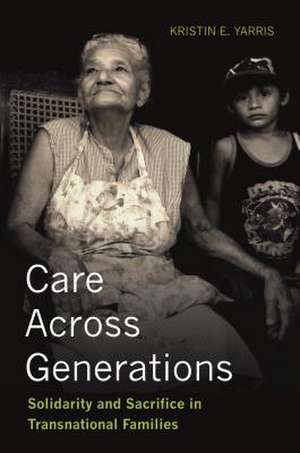Care Across Generations – Solidarity and Sacrifice in Transnational Families
Autor Kristin E. Yarrisen Limba Engleză Paperback – 28 aug 2017
| Toate formatele și edițiile | Preț | Express |
|---|---|---|
| Paperback (1) | 195.75 lei 6-8 săpt. | |
| MK – Stanford University Press – 28 aug 2017 | 195.75 lei 6-8 săpt. | |
| Hardback (1) | 616.05 lei 6-8 săpt. | |
| MK – Stanford University Press – 28 aug 2017 | 616.05 lei 6-8 săpt. |
Preț: 195.75 lei
Nou
Puncte Express: 294
Preț estimativ în valută:
37.46€ • 40.68$ • 31.47£
37.46€ • 40.68$ • 31.47£
Carte tipărită la comandă
Livrare economică 22 aprilie-06 mai
Preluare comenzi: 021 569.72.76
Specificații
ISBN-13: 9781503602885
ISBN-10: 1503602885
Pagini: 216
Dimensiuni: 188 x 229 x 14 mm
Greutate: 0.32 kg
Editura: MK – Stanford University Press
ISBN-10: 1503602885
Pagini: 216
Dimensiuni: 188 x 229 x 14 mm
Greutate: 0.32 kg
Editura: MK – Stanford University Press
Cuprins
Contents and Abstracts
1Tenemos Que Hacerlo: Responsibility and Sacrifice in Grandmother Care
chapter abstract
This chapter reviews patterns of gender and kinship in Nicaraguan families and shows how gendered inequalities shape grandmothers' assumption of caregiving following mother migration. The chapter uses ethnographic examples to demonstrate how grandmothers respond to these gendered inequalities, negotiating relationships with children's fathers and managing the legal and social vulnerabilities related to their roles as intergenerational caregivers. The chapter shows how grandmothers experience caregiving as both a responsibility-providing everyday care for children-and as a source of emotional connection, meaning, and motivation. The chapter documents how grandmothers respond to the prospect of family reunification-the migration of the children in their care to join mothers abroad-by drawing on values of solidarity and sacrifice.2No Se Ajustan: Remittances and Moral Economies of Migration
chapter abstract
This chapter explores the material and affective dimensions of remittances to illustrate the reconfigurations of care in transnational families and the related tensions. The chapter shows how a solely material view of the money migrants send from abroad fails to capture the complex emotional and affective dimensions of remittances from the perspective of grandmothers and the children in their care. Just as remittances are a concrete sign that mothers abroad remain pendiente (responsible) for families in Nicaragua, they also serve as an unavoidable reminder of mothers' ongoing absence from everyday family life. In this way, grandmothers' insistence of remittances that no se ajustan (they do not measure up) indexes a moral economy of care and migration that sets remittances against the values of sacrifice and solidarity that grandmothers seek to foster in transnational family life.3Pensando Mucho: Transnational Care and Grandmothers' Distress
chapter abstract
This chapter demonstrates the cultural significance of grandmothers' roles as caregivers in transnational families by exploring their experiences of embodied, emotional distress. Specifically, the chapter argues that grandmother caregivers use the expression pensando mucho (thinking too much) to express the uncertainties and troubles of transnational family life. The idiom of "thinking too much" indexes the moral ambivalence of mother migration, which grandmothers understand to be an economic necessity but which threatens values for unity and solidarity in family life. In this analysis, by thinking too much grandmothers increase the visibility of their caregiving by inscribing their significance through a specific set of somatic symptoms. This communicative aspect of pensando mucho allows grandmothers to draw attention to their embodied distress, signaling the disruption of transnational family life while emphasizing the cultural value of their care.4Care and Responsibility Across Generations: A Family Migration Portrait
chapter abstract
This chapter presents the story of one Nicaraguan transnational family, showing how migration's impacts on those who stay behind in migrant-sending countries are embedded in time and imprinted across generations. In particular, this close analysis of one family's experience with migration, taking the grandmother's perspective as the central analytical starting point, demonstrates how past experiences of migration influence family members' responses to migration in the present, and how-in turn-present uncertainties shape hopes and fears for the future. This intergenerational perspective demonstrates the importance of analyzing migration as both a temporal and a spatial process, widening our analytical lens on transnational family life across time and, cumulatively, over generations.Conclusion: Valuing Care Across Borders and Generations
chapter abstract
Focusing attention on grandmother caregivers' experiences of the uncertainties of transnational family life calls us to think more broadly about migration's effects on extended families across national borders, in host and home countries, and across generations, beyond mothers and children and into the networks of extended kin who assume essential caregiving roles in migrant-sending countries like Nicaragua. Grandmothers in Nicaraguan families assume responsibilities for children of mother migrants through an informal reconfiguration of caregiving and kinship obligations, although they lack legal protection and social support. This chapter reviews the social and political consequences of approaching transnational migration from an intergenerational perspective, presenting possible policy responses in migrant-sending and migrant-receiving countries that would value intergenerational care and support migrants, caregivers, and children in transnational families.Introduction: Solidaridad: Nicaraguan Migration and Intergenerational Care
chapter abstract
This chapter presents an overview of the values of solidarity and sacrifice and their meanings in relation to the reconfigurations of care and kinship that follow mother migration. The chapter reviews political and economic dynamics relevant for understanding contemporary Nicaraguan migration. The chapter situates intergenerational care in transnational families within recent research on migration and care, including care chains and care circulations, showing how grandmothers are central actors in global transformations of care economies. The chapter also reviews current anthropological theorizing about care, showing how intergenerational care is a moral practice oriented toward upholding cultural values for family continuity and for children's everyday well-being in families divided by borders.Notă biografică
Kristin E. Yarris is Assistant Professor of International Studies at the University of Oregon.
